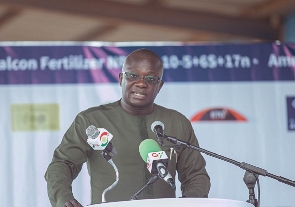Bryan Acheampong, the Minister for Food and Agriculture, has assured farmers across the country of his resolve to work closely with them to increase yields and productivity while reducing the importation of food crops into the country.
He said the Ministry was implementing strategic measures to guarantee farmers around the nation have access to inputs and other production costs to lessen their burden and boost their incomes.
The Minister gave this assurance when farmers, traders, and aggregators from the Peasant Farmers Association of Ghana (PFAG) called on him in his Office in Accra to discuss pertinent issues affecting the growth of the sector.
The issues discussed ranged from the current onion crisis, which has resulted in the lock-up of over 60 trucks of imported onions at the Benin and Burkina Faso border, the implementation of the Planting for Food and Jobs (PFJ) 2.0 and the implications of the new Tax Exemptions Act on the prices of agricultural inputs.
Mr Acheampong, addressing the issue on the onion crisis said the government’s preoccupation was to ensure enough production of onions locally to reduce and eventually stop its importation.
He emphasised that while the government was concerned about their locked-up goods and was working diplomatically to resolve them, the priority of the Ministry was to bring onion producers together and work out a modality that would address the current challenges that were preventing them from producing enough for the country.
The Minister said the Ministry had worked out modalities for the implementation of the PFJ 2.0, which was expected to be launched later in August and would address the major concerns of farmers.
He said with the aggregator system under the PFJ 2.0, farmers would have access to seeds, fertilizers, extension services, mechanisation, and post-harvest services and would only repay the cost of these services after harvesting.
On the criteria for the selection of the aggregators under the model, the Minister assured that existing aggregators would not be crowded out due to this programme and that the Ministry would continually work with the farmers to ensure that the right aggregators who were working with the farmer were selected.
He said the programme was inclusive in nature and that all farmers, including youth, female farmers, and aggregators, would form an integral part of it.
In the area of the Tax Exemptions Act on agricultural prices, the Minister acknowledged the challenge but added that the cabinet was considering the addition of agricultural inputs for exemptions.
“However, despite the ongoing process, the Ministry continues to approve requests for exemptions for agricultural inputs by importers,” he added.
He lamented the failure of these importers to reflect these exemptions in their prices and urged them to reduce the prices of their products.
He said, “Even though the proposal has been sent for cabinet’s approval, as of August alone, we have approved over 60 exemption requests from importers. The problem is when prices go up, no matter what we do, our business is unwilling to bring prices down and that is the problem. Irrespective, I will do all I can to ensure your request is granted.”
Dr. Charles Nyaaba, Executive Director, PFAG commended the Minister for his unwavering resolve to work with farmers to improve the fortunes of the sector.
He pledged the Association’s cooperation and support to the Minister to enable him to achieve his long-term vision of ensuring food sufficiency in the country.
He called on farmers, value chain actors, and service providers to join in helping to make Ghana a food hub for the sub-region and urged them to also bring on board proposals as the Minister was open to receiving recommendations from various stakeholders.
Business News of Saturday, 19 August 2023
Source: GNA













